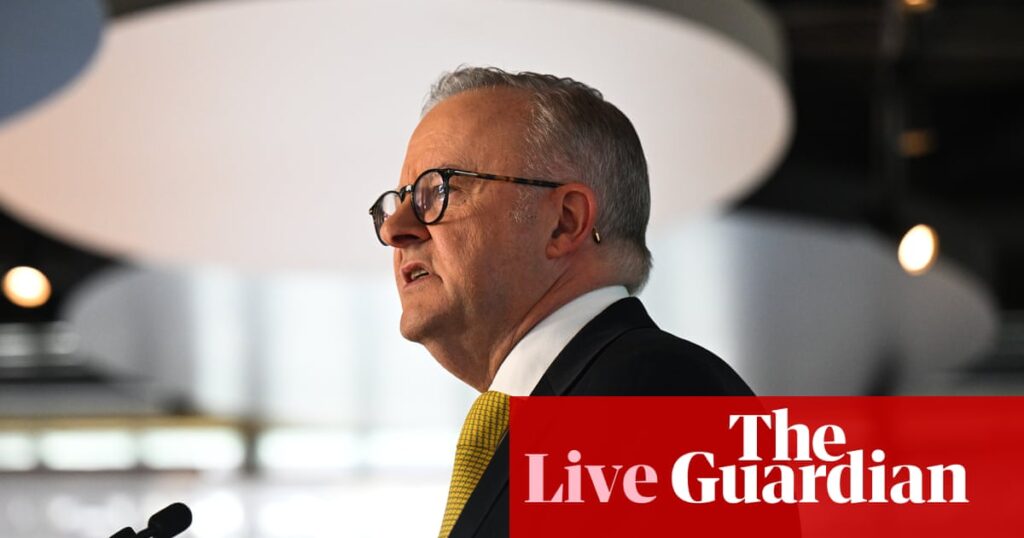Coalition ‘didn’t have a phone conversation’ with China during term, says Albanese
Albanese has said his focus is on reaching “more agreement and less disagreement” with China when asked about criticism his visit this week had not achieved tangible benefits for Australia.
The prime minister pointed to increased cooperation between China and his government compared to the previous Coalition government as proof of results. He told reporters:
If you compare the difference of this visit with the failure of the Coalition during the last term, during the term in which I was opposition leader, they didn’t have a phone conversation between a single minister in Australia and our major trading partner.
What we’ve had is constructive engagement. … The fact that you have the four major Australian resource and iron ore exporters – BHP, Rio Fortescue and Hancock – all sitting down with their Chinese purchasers of their products, that benefits Australia enormously.
Albanese said he was looking forward to continuing conversation over points of cooperation with Chinese leaders, with visits from Communist party chair, Zhao Leji, to come later this year. He said:
What I’d like to see is to be able to talk about those issues regularly, get as much agreement as possible … Out of understanding, can come greater cooperation.
Key events
Benita Kolovos
Acting Vic premier on latest reports about the child sexual abuse allegations
The acting premier, Jaclyn Symes, was also asked about the story, first reported by the ABC, that Joshua Dale Brown was sacked from a Melbourne childcare centre after working there for just three weeks.
Nido Early School on Thursday confirmed it terminated Brown from its Werribee childcare service during his probation period in July 2021, after he allegedly breached the company’s internal policies around handling of incident reports. It did not relate to any behaviour with children.
Three months later, in October 2021, Brown started working at the Creative Garden Early Learning Centre in Point Cook, where police allege he sexually abused children in his care between 2022 and 2023.
Symes said it was a “horrific series of events that has shocked and distressed Victorians, and rightly so”. She said:
This is why making sure that we have clearer data, sharing, clearer registration and knowing where people are in the future will make sure that you can identify more concerning behaviour.
Australian dollar falls to lowest point in nearly a month
The Australian dollar has fallen to its lowest level against the US dollar in almost a month, after unemployment jumped in June, as traders hike their bets on a Reserve Bank interest rate cut.
The dollar has levelled off at less than 64.9 cents after hitting a low of 64.76 US cents on Thursday afternoon. It hasn’t been that low since 24 June, when global markets shuddered after the Trump administration bombed Iranian nuclear facilities.
A ceasefire between Israel and Iran followed by the Reserve Bank’s surprise decision to leave interest rates on hold helped the dollar higher in the weeks since, peaking at nearly 66 US cents on 11 July.
One week on, the dollar has slipped after a surprise jump in Australia’s unemployment rate to 4.3% in June, above the RBA’s expectation of a smaller rise to 4.2% and market predictions the rate would hold at 4.1%.
Strong job creation and a shortage of workers has been one of the key reasons the RBA has cited when deciding to delay rate cuts this year, so a weaker jobs market points to a higher chance of an interest rate cut. That would lower the return on Australian investments, which is why investor demand for local dollars has dropped.
Australia to seek more ‘direct investment’ from China
Albanese has signalled his government will push for greater business and financial ties with China, singling out emissions reduction and green steel production as a sector for future focus.
The prime minister the said he had told Chinese leaders he wanted more Australian dollars flowing into China:
I want to see more direct investment here. It’s something that I’ve raised.
Albanese said the preceding Coalition government had overseen a decline in Australian investment in its major trade partner, and cheered the business-to-business conversations that have occurred during his visit this week:
The year in which it began to decline, 2019, [involved the specific issues during that term of the Morrison government … What you have had with this [trip], though, is concrete discussions and agreements going forward between Australian companies and Chinese companies.
‘Nothing that he has said to me has he not fulfilled’, says Albanese on relationship with Xi
Albanese has declined to say whether he trusts Xi Jinping, saying his visit to China had showed him the regional power was confident and innovative.
The prime minister told reporters he had a warm relationship with the Chinese president but did not directly answer when asked whether Xi had earned his trust.
Albanese had previously avoided saying whether he trusted Xi in 2023 following his trip to China that year. He gave a similar answer today:
I have no reason – nothing that he has said to me has he not fulfilled. So I give the same answer that I gave last time.
The prime minister praised the Chinese president for visiting every Australian state and territory in the past, adding he had valued the chance to travel widely through China on his trip.
Albanese said the trip had shown him China had a confident and forward-looking sense of itself.
China sees itself as confident going forward, and you come to this city [Chengdu] … more innovative architecture than in any city I have been to around the world. Quite clearly new, dynamic, it’s creative.
Coalition ‘didn’t have a phone conversation’ with China during term, says Albanese
Albanese has said his focus is on reaching “more agreement and less disagreement” with China when asked about criticism his visit this week had not achieved tangible benefits for Australia.
The prime minister pointed to increased cooperation between China and his government compared to the previous Coalition government as proof of results. He told reporters:
If you compare the difference of this visit with the failure of the Coalition during the last term, during the term in which I was opposition leader, they didn’t have a phone conversation between a single minister in Australia and our major trading partner.
What we’ve had is constructive engagement. … The fact that you have the four major Australian resource and iron ore exporters – BHP, Rio Fortescue and Hancock – all sitting down with their Chinese purchasers of their products, that benefits Australia enormously.
Albanese said he was looking forward to continuing conversation over points of cooperation with Chinese leaders, with visits from Communist party chair, Zhao Leji, to come later this year. He said:
What I’d like to see is to be able to talk about those issues regularly, get as much agreement as possible … Out of understanding, can come greater cooperation.
PM denies Coalition claims China trip lacked concrete diplomatic outcomes
Anthony Albanese denied his trip to China had been “indulgent,” after opposition frontbencher James Paterson criticised the prime minister for visiting the Great Wall of China and meeting pandas in Chengdu.
The visit had focused on building diplomatic relations, Albanese said, pointing to the economic benefits of stronger ties between China and Australia. He told reporters:
The Great Wall of China symbolises the extraordinary history and culture here in China, and showing a bit of respect to people never cost anything. But you know what it does? It gives you a reward.
Paterson had criticised Albanese’s focus on “a Gough Whitlam history tour” of China and a lack of concrete diplomatic outcomes. Asked whether he had past prime ministers’ visits to China in mind during the visit, Albanese said:
“I was thinking more of them than I was of James Paterson, it’s fair to say. But it’s also the case I was thinking of how worthwhile it is for Australia as well. Those pictures go to 27 million people, potentially, in Australia. They go to over a billion people in China … who increasingly are rising up the income ladder and are potential tourists and therefore job creators in Australia.
If James Patterson doesn’t understand that, then he doesn’t understand much.
Albanese praises Xi after ‘very successful visit’ to China
Australia is focused on “today and tomorrow rather than the past” in its relationship with China, Anthony Albanese has said, as he approaches the end of what he described as a “very successful visit” to China.
Asked about Chinese leaders’ references to past difficulties in the relationship between the two countries, Albanese said he was looking to the future:
Overwhelmingly what we discuss is moving forward is issues of today and tomorrow rather than the past. And it’s something that I very much have concentrated on. What I speak about is the potential that’s there to grow the relationship, to develop further economic ties.
Speaking after a medical technology luncheon in Chengdu, the prime minister pointed to the signing of two-way trade agreements and two way tourism agreements and his meetings with China’s top leadership as evidence of his success.
Albanese praised China’s Xi Jinping, who he said had congratulated him on his election win earlier this year:
President Xi is warm and engaging. We have had four bilateral meetings but have also engaged at other times as well on an informal basis. That’s a positive thing. President Xi sent a very warm message of congratulations, as did other leaders after the May 3rd election.

Luca Ittimani
Thanks for staying with us this Thursday. I’ll be taking you through the afternoon’s news.

Nick Visser
That’s all for me, thanks for sticking with us through the start of the day’s news. Luca Ittimani will take the reins from here.

Tom McIlroy
Chalmers says unemployment figures show economy ‘not immune’ from uncertainty
The treasurer, Jim Chalmers, weighed in on today’s unemployment numbers from the G20 meeting of finance ministers and central bank governors in Durban, South Africa.
He says the increase in the unemployment rate to 4.3% in June is “the inevitable consequence of economic uncertainty and volatility around the world and the ongoing impact of higher interest rates.” Chalmers added:
Despite all the challenges coming at us, Australia’s unemployment rate remains historically low and we’re pleased to see the participation rate remains near-record highs.
The ongoing resilience in our labour market over the past three years remains one of our best defences against the volatile global economic conditions we face, which is a big focus of my discussions here at the G20.
The Australian economy is not immune from global uncertainty but we are well‑placed and well‑prepared to face the challenges ahead.
Coalition says unemployment numbers ‘not what Labor promised’

Tom McIlroy
The Coalition blamed Labor for today’s surprise uptick in unemployment, saying the increase to 4.3% in June shows the Albanese government is “failing to manage the economy”.
Markets had been expecting unemployment to remain steady at 4.1% for the sixth consecutive month. Instead, the increase puts the jobless rate at its highest level since 2021. The shadow treasurer, Ted O’Brien, said working Australians were finding it harder to get a job under Labor:
The unemployment rate is now at its highest level since November 2021, with 34,000 more Australians out of work this month alone. This is not what Labor promised.
While Australians are working hard just to keep up with the cost of living, Labor’s economic mismanagement is making it even harder for households to make ends meet.
O’Brien accused the government of being “heavy on spin and light on delivery”.
We know people are doing it tough and we need to ensure our policies reflect the aspirations of everyday Australians who want more secure, well-paid jobs.

Josh Taylor
Meta argues its AI needs personal information from social media posts to learn ‘Australian concepts’
Meta has urged the Australian government not to make privacy law changes that would prevent the company using personal information taken from Facebook and Instagram posts to train its AI, arguing the AI needs to learn “how individuals discuss Australian concepts”.
In a submission to the Productivity Commission’s review on harnessing data and digital technology, published this week, the parent company of Facebook, Instagram and WhatsApp argued for a “global policy alignment” in the Albanese government’s pursuit of privacy reform in the AI age.
Meta said generative AI models “require large and diverse datasets” and cannot rely on synthetic data – data generated by AI alone. The company said available databases, such as Australian legislation, were limited in what they could offer AI compared to datasets containing personal information.
Meta has been training its AI, Llama, on publicly accessible Facebook and Instagram posts since last year. The company was ordered to stop training its data on users’ posts for those based in Europe, and Meta ultimately gave users in the EU an opt-out option.
Read more:

Tom McIlroy
Should Jim Chalmers’ productivity roundtable have voice representing the environment?
The Australian Conservation Foundation wants voices representing the environment to have a seat at the table in the Albanese government’s upcoming productivity summit.
The treasurer, Jim Chalmers, will convene three days of talks with business leaders, trade unions and eminent Australians next month, for discussions about reforms to the economy and Labor’s second term agenda.
ACF’s nature program manager, Basha Stasak, said the biggest threat to Australia’s future productivity comes from the destruction of nature. The group wants the environment minister, Murray Watt, to proceed with planned changes to the Environment Protection and Biodiversity Conservation Act, delayed in the last parliament over political concerns by Labor. Stasak said:
Repairing Australia’s broken nature protection law is one critical thing the Albanese government can do to boost productivity. Research by ACF shows roughly half Australia’s GDP – 49% or $896 billion – has a moderate to very high direct dependence on nature.
It will be important for the upcoming productivity roundtable to consider the importance of healthy nature to a healthy economy.
So far, invitations to the summit in the cabinet room include the Productivity Commission, the ACTU, the Australian Chamber of Commerce and Industry, the Business Council and the Australian Council of Social Service.
Chalmers is due to announce more invitations soon.
Bearded dragons outfitted with tiny backpacks lead to surprise finding
New research, gathered with tiny fitness trackers outfitted on Australian central bearded dragons, found lizards who ran the fastest were more likely to die than their slower compatriots, a surprising finding at odds with scientists’ assumptions.
The study, published today and led by Dr Kristoffer Wild from the University of Melbourne, saw several bearded dragons tracked with “wearable smart devices” that contained tiny accelerometers and temperature-sensing radio transmitters.
While many animals are assumed to do better in the wild if they are faster than their kin, Wild’s research showed bearded dragons had a greater risk of mortality if they were faster than others. Wild said in a media release:
What we believe is happening is that speedy lizards are engaging in riskier behaviours, such as moving around more openly and frequently, making them vulnerable to predators like birds and cats.
We found that increased risk was especially pronounced during spring, so this would make sense with dragons moving around a lot more looking for mates.
Albanese wraps China tour touting ongoing cooperation to build ‘healthier, more prosperous future’
The prime minister, Anthony Albanese, just spoke in Chengdu, China, as he wraps up his visit to the country. He gave a short speech praising cooperation and trade between the two nations and said collaboration between Chinese and Australian firms would serve as a model for further cooperation and growth. He said:
Governments can build and expand this architecture of cooperation. Yet, ultimately, it is people who give it strength and life. Our partnership works because you work together. You engage. You share and you shape ideas. …
The positive difference that all of you have made to people’s lives is powerful proof of what can be achieved when Australia and China work together in the best interests of all of our citizens. I should add, as well, that that is in the interests of the global community, as well as our two nations. Let us continue to build a healthier, more prosperous future for the people of Australia and the people of the People’s Republic of China.
The humpback whale that swam to Circular Quay, delighting ferry passengers, has left Sydney Harbour

Natasha May
A young humpback whale who wandered from its usual migratory route right up to Sydney’s Harbour Bridge has left the harbour.
The sub-adult whale left the body of water, with no sign of it on Thursday morning, a government source told Guardian Australia.
The whale delighted onlookers and experts after it was first spotted swimming at Circular Quay on Wednesday morning before moving east on what experts tracking the mammal called its “full harbour experience”.
Dr Vanessa Pirotta, a whale expert on board a New South Wales Maritime boat on Wednesday, confirmed the whale was “not in distress, quite the opposite”. It appeared to be inquisitive and relaxed, visiting various harbourside locations, she said.
The whale’s appearance was a “reminder that Sydney Harbour is very wild”.
Read more:
Up to 7 metre waves forecast in parts of Australia as cold fronts create huge swells
Weatherzone reports cold fronts to the south and southwest of Australia have been generating gale to storm-force winds over the last few days across a large area of ocean. Seas exceeding 10 metres have been generated within the core of the storm, with some waves topping 5 metres extending west of Tasmania to nearly Africa.
Significant waves of up to 6 metres are expected to be present off the south-west corner of Western Australia until early Saturday, with some waves exceeding that 6 metre mark on Friday morning.
Parts of South Australia, southwest Victoria and western Tasmania are also expected to see wave heights more than 4.5 metres on Thursday. The exposed west coast of Tasmania could see increased swells, possibly up to 7 metres, on Saturday.


